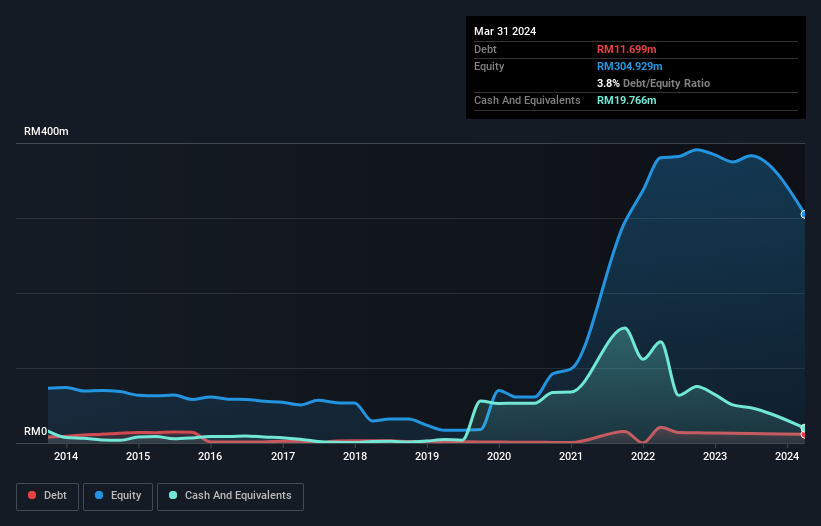- Malaysia
- /
- Healthcare Services
- /
- KLSE:HONGSENG
Hong Seng Consolidated Berhad (KLSE:HONGSENG) Has Debt But No Earnings; Should You Worry?
The external fund manager backed by Berkshire Hathaway's Charlie Munger, Li Lu, makes no bones about it when he says 'The biggest investment risk is not the volatility of prices, but whether you will suffer a permanent loss of capital.' When we think about how risky a company is, we always like to look at its use of debt, since debt overload can lead to ruin. As with many other companies Hong Seng Consolidated Berhad (KLSE:HONGSENG) makes use of debt. But is this debt a concern to shareholders?
When Is Debt Dangerous?
Debt is a tool to help businesses grow, but if a business is incapable of paying off its lenders, then it exists at their mercy. Part and parcel of capitalism is the process of 'creative destruction' where failed businesses are mercilessly liquidated by their bankers. However, a more common (but still painful) scenario is that it has to raise new equity capital at a low price, thus permanently diluting shareholders. Of course, plenty of companies use debt to fund growth, without any negative consequences. When we examine debt levels, we first consider both cash and debt levels, together.
View our latest analysis for Hong Seng Consolidated Berhad
What Is Hong Seng Consolidated Berhad's Net Debt?
You can click the graphic below for the historical numbers, but it shows that Hong Seng Consolidated Berhad had RM11.7m of debt in March 2024, down from RM13.0m, one year before. However, it does have RM19.8m in cash offsetting this, leading to net cash of RM8.07m.

A Look At Hong Seng Consolidated Berhad's Liabilities
Zooming in on the latest balance sheet data, we can see that Hong Seng Consolidated Berhad had liabilities of RM19.8m due within 12 months and liabilities of RM21.2m due beyond that. Offsetting this, it had RM19.8m in cash and RM90.4m in receivables that were due within 12 months. So it actually has RM69.2m more liquid assets than total liabilities.
This surplus liquidity suggests that Hong Seng Consolidated Berhad's balance sheet could take a hit just as well as Homer Simpson's head can take a punch. With this in mind one could posit that its balance sheet means the company is able to handle some adversity. Succinctly put, Hong Seng Consolidated Berhad boasts net cash, so it's fair to say it does not have a heavy debt load! The balance sheet is clearly the area to focus on when you are analysing debt. But it is Hong Seng Consolidated Berhad's earnings that will influence how the balance sheet holds up in the future. So when considering debt, it's definitely worth looking at the earnings trend. Click here for an interactive snapshot.
Over 12 months, Hong Seng Consolidated Berhad reported revenue of RM15m, which is a gain of 29%, although it did not report any earnings before interest and tax. Shareholders probably have their fingers crossed that it can grow its way to profits.
So How Risky Is Hong Seng Consolidated Berhad?
Although Hong Seng Consolidated Berhad had an earnings before interest and tax (EBIT) loss over the last twelve months, it generated positive free cash flow of RM4.8m. So taking that on face value, and considering the net cash situation, we don't think that the stock is too risky in the near term. We also take heart from the solid 29% revenue growth in 12 months; undoubtedly a good sign. That growth could mean this is one stock well worth watching. There's no doubt that we learn most about debt from the balance sheet. However, not all investment risk resides within the balance sheet - far from it. Case in point: We've spotted 3 warning signs for Hong Seng Consolidated Berhad you should be aware of, and 1 of them is a bit unpleasant.
If you're interested in investing in businesses that can grow profits without the burden of debt, then check out this free list of growing businesses that have net cash on the balance sheet.
Valuation is complex, but we're here to simplify it.
Discover if Hong Seng Consolidated Berhad might be undervalued or overvalued with our detailed analysis, featuring fair value estimates, potential risks, dividends, insider trades, and its financial condition.
Access Free AnalysisHave feedback on this article? Concerned about the content? Get in touch with us directly. Alternatively, email editorial-team (at) simplywallst.com.
This article by Simply Wall St is general in nature. We provide commentary based on historical data and analyst forecasts only using an unbiased methodology and our articles are not intended to be financial advice. It does not constitute a recommendation to buy or sell any stock, and does not take account of your objectives, or your financial situation. We aim to bring you long-term focused analysis driven by fundamental data. Note that our analysis may not factor in the latest price-sensitive company announcements or qualitative material. Simply Wall St has no position in any stocks mentioned.
About KLSE:HONGSENG
Hong Seng Consolidated Berhad
An investment holding company, engages in gloves and NBL manufacturing, healthcare, and financial services in Malaysia and Australia.
Good value with adequate balance sheet.
Market Insights
Community Narratives



